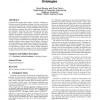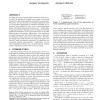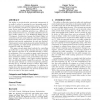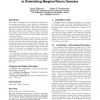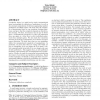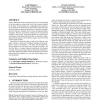126
Voted
ATAL
2008
Springer
15 years 3 months ago
2008
Springer
Communication among agents requires a common vocabulary to facilitate successful information exchange. One way to achieve this is to assume the existence of a common ontology amon...
97
Voted
ATAL
2008
Springer
15 years 3 months ago
2008
Springer
We describe how to take a set of interaction traces produced by different pairs of players in a two-player repeated game, and combine them into a composite strategy. We provide an...
110
Voted
ATAL
2008
Springer
15 years 3 months ago
2008
Springer
We define the class of games called simulation-based games, in which the payoffs are available as an output of an oracle (simulator), rather than specified analytically or using a...
123
Voted
ATAL
2008
Springer
15 years 3 months ago
2008
Springer
The ability to provide flexible, automated management of air traffic is critical to meeting the ever increasing needs of the next generation air transportation systems. This probl...
116
Voted
ATAL
2008
Springer
15 years 3 months ago
2008
Springer
We consider a multiagent resource allocation domain where the marginal production of each resource is diminishing. A set of identical, self-interested agents requires access to sh...
115
Voted
ATAL
2008
Springer
15 years 3 months ago
2008
Springer
We address the learning of trust based on past observations and context information. We argue that from the truster's point of view trust is best expressed as one of several ...
108
Voted
ATAL
2008
Springer
15 years 3 months ago
2008
Springer
Complexity theory is a useful tool to study computational issues surrounding the elicitation of preferences, as well as the strategic manipulation of elections aggregating togethe...
106
Voted
ATAL
2008
Springer
15 years 3 months ago
2008
Springer
In many multiagent settings, each agent's goal is to come out ahead of the other agents on some metric, such as the currency obtained by the agent. In such settings, it is no...
117
Voted
ATAL
2008
Springer
15 years 3 months ago
2008
Springer
We generalize AGM belief revision theory to the multi-agent case. To do so, we first generalize the semantics of the singleagent case, based on the notion of interpretation, to th...
108
Voted
ATAL
2008
Springer
15 years 3 months ago
2008
Springer
Bots for Real Time Strategy (RTS) games provide a rich challenge to implement. A bot controls a number of units that may have to navigate in a partially unknown environment, while...
